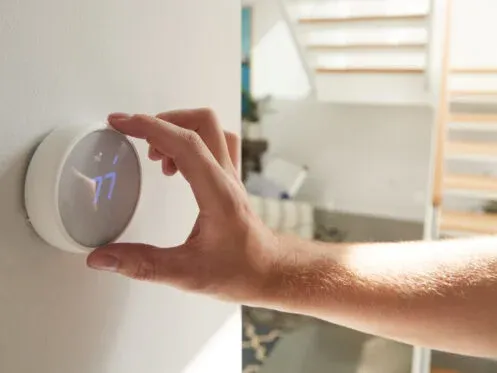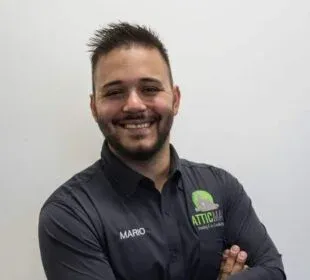HVAC systems always substantially impact the environment since they require so much energy to run. Switching your home’s heating system to run on a heat pump is one of the best ways to reduce the environmental impact of using an HVAC system to cool and heat your home. That said, you can also take several practical steps without needing to replace your existing HVAC.
Adjust Your Temperature Settings
One of the easiest ways to reduce your HVAC system’s energy usage and environmental impact is to adjust the temperature you set your thermostat to. The US Department of Energy recommends setting your thermostat no higher than 68 degrees in the winter so that your heating system doesn’t need to run as much. If 68 degrees seems too low, you can wear extra layers to keep warm.
During the summer, you can keep your air conditioning set to around 74 to 76 degrees without feeling too uncomfortable. You can then use ceiling and standing fans to help keep you cool any time you start to feel too hot.
Another essential thing to do is adjust your thermostat temperature before bed and again before leaving for work. ENERGY STAR recommends turning your AC up or heating down by 7 degrees from your usual setting during the day when you’re working and then up or down by 4 degrees before going to bed. Doing so will usually reduce your HVAC system’s total yearly energy consumption by around 10%.
However, it depends on the age of your HVAC system and how effectively it works. With an older system, you probably don’t want to adjust the temperature by more than 4 degrees when you’re at work. Any more and your HVAC could struggle to bring the temperature back to your typical setting. That means it may potentially use more energy than it would if you just left the temperature the same during the day.
Control Your HVAC With a Smart Thermostat
The use of smart thermostats has soared in recent years due to their advantages over standard programmable thermostats. One of the most significant benefits is that a smart thermostat will almost always reduce the energy usage of your HVAC system. Most smart thermostats allow you to monitor your HVAC system’s energy usage through the manufacturer’s thermostat app. That makes it easy to balance comfort and energy savings better.
Let’s say you usually turn your AC up by 7 degrees before going to work, and it then takes the system a reasonably long time to bring the temperature back down in the afternoon. In this situation, you can try turning the temperature down by only 3-4 degrees during the day and quickly see whether it increases or decreases in energy usage.
ENERGY STAR-certified smart thermostats also use algorithms to determine how your thermostat settings impact your HVAC system’s energy consumption. They can then use this information to suggest changes you can make to the settings to help save on energy. Many units also come with sensors that you place around your home that allow the thermostat to learn your everyday routines. The smart thermostat can adjust the temperature settings based on when you wake up, go to work, leave work, get home, and go to bed.
Another noteworthy advantage of a smart thermostat is that you can use the app to control it remotely. If you have to work late or have something you must do after work, you can quickly switch the setting so that the temperature turns back up or down later than normal. That makes it easy to ensure that your heating or AC doesn’t run needlessly when no one is home.
Schedule an Annual AC and Heating Tune-up
One of the things that will make the biggest difference in energy efficiency is having a professional technician service your air conditioning each spring and your heating every fall. Maintenance is critical for an HVAC system to continue operating effectively and limiting how much it needs to run. It also has the added benefits of reducing repair needs and helping to extend the life of your AC, heat pump, or furnace.
Without regular maintenance, you can be sure that your HVAC system’s performance will decrease over time. That means it will take longer for the system to fully cool or heat your home, resulting in greater wear and tear and increased energy consumption.
Another reason why an annual tune-up is important is that part of it includes the technician performing a full inspection and diagnostic service. Specific components in heating and air conditioning systems wear out more quickly than others, and various components can also start malfunctioning. If the diagnostic service reveals any issues with your system’s components, you can get the component repaired or replaced immediately. That way, you can ensure that your AC or heating functions optimally and efficiently.
Change the Air Filter Regularly
Professional maintenance is essential, but you must also change the air filter in your HVAC system regularly to maintain it properly. The issue with failing to change the filter often enough is that a dirty filter can significantly restrict airflow. What happens is that the pleats in the filter eventually start to clog so that much less air can flow through the filter at one time. The reduced air coming into your HVAC system results in it putting out much less hot or cool air, which in turn causes it to stay on for longer and consume more energy.
The basic recommendation is that you replace your HVAC system’s air filter every two to three months. Going any longer without putting in a new filter will almost always result in decreased performance and energy efficiency.
Make Sure Your Attic and Exterior Walls Are Sufficiently Insulated
Another thing you should do if you have an older home is have a professional check that your house’s exterior walls, especially the attic, are sufficiently insulated. A lack of insulation usually isn’t an issue for most newer homes, but it can be for older houses. Part of the reason is that standards have improved in recent years, and another reason is that some types of insulation lose their effectiveness over time.
If your home is poorly insulated, your HVAC system will have a much more significant environmental impact since the heat loss and heat gain through the exterior structure result in your AC and heating needing to run more.
Whether you need to have your HVAC system serviced or your home insulated, you can trust the experts at Atticman Heating and Air Conditioning, Insulation for help. We have years of experience serving customers in Sacramento and surrounding areas and can help ensure your HVAC works as efficiently as possible. We also offer energy-efficient home upgrades like whole-house fans, heat pumps, mini-splits, and water heaters that can help you lower your carbon footprint even more without sacrificing comfort. For more information on how we can help make your HVAC and home more energy efficient, contact us today.


